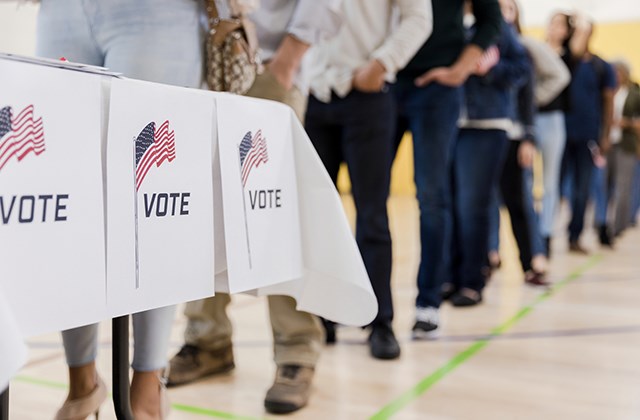Ahead of Tuesday’s presidential election, 68% U.S. adults said it had been a source of stress, a 15 percentage point increase from the 2016 election, according to an October American Psychological Association report.
According to Steven Stosny, the couples therapist who coined the term “election stress disorder,” pervasive negativity compounded by amplified news and social media exposure leads people to feel less productive and experience more stress, anger and anxiety.
And now that Election Day has come and gone, local groups are offering chances for people to debrief and look ahead, and mental health and lifestyle professionals are offering words of wisdom on how to best move past the anxiety.
Studies in the U.S. and abroad, have looked at the implications of election distress on mental health as well as physical illness, and, while a large percentage of people experience election-related stress, regardless of political affiliation, some groups are more impacted than others.
Urszula Bunting, a Niwot-based lifestyle blogger, agrees the current political climate is particularly challenging for many across the U.S.
“The year 2020 has taught us more than we were ready to learn,” she stated in a recent blog post. “We are getting an accelerated degree in life with minors in homeschooling, managing a dining-room office, maintaining healthy family relations, demystifying daily news, cooking from scratch, eating at home, overseeing Zoom birthday parties, and using grandma’s sewing machine to make face masks to share with neighbors no matter their political position.”
Additionally, it seems like people have become increasingly aware of the importance of voting and making their voice count, Bunting said.
An unprecedented 103.2 million people cast their ballots early in this year’s presidential election, according to recent tallies, shattering previous elections records. However, high numbers of early votes also means it might take longer to get results, exacerbating the experience of distress.
Rhonda Beaupre, local licensed marriage and family therapist and executive director at Krupnick Counseling Associates, said she has seen many people come in with concerns about the election.
“There has been an increase in anxiety and stress related to the election. I would say it probably started about two or three months ago that I've been seeing people have anticipatory anxiety regarding the election,” she said.
It’s not just the uncertainty and a sense of unrest regarding the election, but the fact that some people are uneasy about their own sense of safety, she said. “It really has been an ongoing chronic stressor, in my opinion.”
Voters that visited polls in Longmont on Election Day, also shared some concerns.
Cate Powers, who visited the Ed and Ruth Lehman YMCA Tuesday morning to cast her vote, said she has experienced anxiety about the potential election outcomes.
"I definitely had anxiety this morning just in regard to everybody. No matter how or who you vote for, it is just the way that the world is that just makes me sad, that no matter the outcome, it is going to disappoint someone. It's nerve-wracking having kids and just seeing where the world is going to be in a few days,” she said.
For Chantel Mauck, another Longmont voter out on Election Day, this whole year has been stressful.
“I am concerned for the future of our country but I am also concerned with the immaturity of society. Whoever wins we need to back our president and support him no matter what. It's not going to change if you riot or loot. It's our president of the United States and we have to back him up," she said.
Given the general sentiment and issues that are at stake this election, multiple local groups have coordinated election-related decompression and discussion sessions.
In anticipation of the election, Kelly Hendricks, owner of Club Pilates, on Friday held a pre-election special class.
“(The Mediation and Release class) was great and so well received,” Hendricks said in an email. “We are being asked to do it again.”
Grey Havens Philosophy, a Longmont-based nonprofit focused on philosophical groups and events, at 6 p.m. today is holding a public nonpartisan discussion about the election. The event will focus on participants’ hopes and dreams for the future and discuss what the election results might mean in a “calm and collaborative way,” according to the website.
Interested participants need to register and pay a fee to join the conversation.
Other groups are taking a more targeted approach to address concerns that might be issue-specific for some community members.
Boulder County Suma, a community engagement effort through the county’s Cultural Brokers Resilience Program, has coordinated a free event to discuss election results and the implications to the Boulder County immigrant community.
“We … expect some social unrest, which might take a toll on the cultural brokers' mental health,” said Guillermo Estrada-Rivera, CBRP and Suma coordinator.
The Zoom event at 10 a.m. Friday will include County Commissioners Elise Jones and Matt Jones and District Attorney Michael Dougherty discussing Boulder County’s historic response with regard to elections and as well as protocols for dealing with hate crimes and racial and anti-immigrant biases, Estrada-Rivera aid.
OUT Boulder County on Wednesday held a free, virtual post-election summit to help equip members of LGBTQ communities with the tools and resources to stay safe, healthy, and informed.
Krupnick Counseling’s Beaupre said now that Election Day has passed, it is important for people to focus on what they can control. “Most people have voted and that was a piece of how (people) could contribute and control the election,” she said.
“At this point there is a wait-and-see (period), so what can help is being mindful in terms of doing some meditation, focusing on your breath, grounding activities. Really working on being present in the moment, focusing on what is important in your life.”



